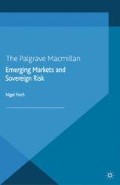Abstract
The objective of this paper is to explore the academic and other literature associated with the development and practices of international rating agencies and to develop a framework to understand the various rating agency methodologies.
Access this chapter
Tax calculation will be finalised at checkout
Purchases are for personal use only
Preview
Unable to display preview. Download preview PDF.
References
Antle, R (1984), ‘Auditor Independence’, Journal of Accounting Research, vol. 22, no. 1, pp. 1–20.
Barnett, D (2004), ‘AMP to Work on Ratings’, Herald-Sun, 8 March, News Ltd, p. 28.
Bauer R, Gunter N & Otten R (2003), ‘Empirical Evidence on Corporate Governance in Europe: The Ellect on Stock Returns, Firm Valuation and Performance’, Journal of Asset Management, vol. 3, no. 4, pp. 296–314.
Brown, D L & Caylor M L (2004), Corporate Governance Study: The Correlation between Corporate Governance and Company Performance, Corporate Governance Study, Institutional Shareholder Services.
Cantor, R & Packer F (1994), ‘The Credit Rating Industry’, Federal Reserve Bank of New York Quarterly Review, Summer-Fall, vol. 19, no. 2, pp. 1–26.
Cantor, R & Packer F (1995), ‘The Credit Rating Industry’, The Journal of Fixed Income, vol. 5, no. 3 (December), pp. 10–34.
Cantor, R & Packer, F (1996), ‘Determinants and Impacts of Sovereign Credit Ratings’, Economic Policy Review, Federal Reserve Bank of New York, vol. 2, no. 2 (October), pp. 37–53.
Cantor, R & Packer, F (1997), ‘Difference of Opinion and Selection Bias in the Credit Rating Industry, Journal of Banking & Finance, vol. 21, no. 10, pp. 1395–1417.
Dillenburg, S, Greene, T & Erekson, H (2003), ‘Approaching Socially Responsible Investment with a Comprehensive Ratings Scheme: Total Social Impact’, Journal of Business Ethics, vol. 43, no. 3, pp. 167–182.
Ferri, G, Liu L & Stiglitz, J (1999), ‘The Procyclical Role of Rating Agencies: Evidence from the East Asian Crisis’, Economic Notes, vol. 28, no. 3, pp. 335–356.
Fowler, G (2002), ‘Sustainability Reporting — A Global Framework’, Company Director, November, Sydney.
Geld, D S & Strawser, J A (2001), ‘Corporate Social Responsibility and Financial Disclosures: An Alternative Explanation for Increased Disclosure’, Journal of Business Ethics, vol. 1, no. 33, pp. 1–13.
Gompers, P A, Ishii, L J & Metrick, A (2003), ‘Corporate Governance & Equity Prices’, Quarterly Journal Of Economics, vol. 118, no. 1, pp. 107–158.
Greene, D (2003), Socially Responsible Investment in Australia, Ethical Investment Association, Sydney.
Hamid, N & Sandford, Y (2002), Portfolio, Index & Futures Research: Are SRI Indices Responsible?, European Equities Research, Deutsche Bank AG.
Harrison, J S & Freeman, R E (1999), ‘Stakeholders, Social Responsibility and Performance: Empirical Evidence and Theoretical Perspectives’, Academy of Management Journal, vol. 42, no. 5, pp. 479–486.
ICAEW (2000), Review of Guidance on Auditor Independence, Institute of Chartered Accountants in England & Wales, London.
Johnstone, K M, Sutton, M H & Warfield, T D (2001), ‘Antecedents and Consequences of Independence Risk: Framework for Analysis’, Accounting Horizons, vol. 15, no. 1 (March), pp.1–18.
McKinsey & Company (2000), Investor Opinion Survey on Corporate Governance, McKinsey & Company, London, UK.
Monfort, B & Mulder, C (2000), ‘The Impact of Using Sovereign Ratings by Credit Rating Agencies on the Capital Requirements for Banks: A Study of Emerging Market Economies’, IMF Working Paper, WP/00/69, March.
Pava, M L & Krausz, J (1996), ‘The Association Between Corporate Social Responsibility and Financial Performance: The Paradox of Social Cost’, Journal of Business Ethics, vol. 3, no. 15, pp. 321–357.
Pound, G, Gay, G & Simnett, R (2002), Auditing Concepts and Methods, McGraw-Hill, Sydney.
Pringle, L M & Bushman, T A (1996), ‘An Examination of Independence in Fact when Auditors Perform Nonaudit Services for Audit Clients’, Accounting Enquiries, vol. 6, no. 1 (August), pp. 91–120.
Roman, R M, Hayobor, S & Agle, B R (1999), ‘The Relationship between Social and Financial Performance’, Business and Society, vol. 38, no. 1, pp. 109–126.
Shockley R A (1981), ‘Perceptions of Auditors’ Independence: An Empirical Analysis’, The Accounting Review, vol. 56, no. 4 (October), pp. 785–800.
Uren, D (2003), The Transparent Corporation: Managing Demands for Disclosure, Allen & Unwin, Sydney.
Waddock, S & Graves, S (1997), ‘The Corporate Social Performance-Financial Performance Link’, Strategic Management Journal, vol. 18, no. 4, pp. 303–319.
Winnie, PHP (2003), ‘Are Unsolicited Credit Ratings Biased Downwards?’, Journal of Banking & Finance, vol. 27, no. 4, pp. 193–614.
Wilson, S (2004), ‘In Good Governance, Westpac Lights the Way’, The Australian, 17 February, p. 25.
Editor information
Editors and Affiliations
Copyright information
© 2015 Nigel Finch
About this chapter
Cite this chapter
Finch, N. (2015). A Framework for Understanding the Acceptability of Rating Agency Methodologies. In: Finch, N. (eds) Emerging Markets and Sovereign Risk. Palgrave Macmillan, London. https://doi.org/10.1057/9781137450661_8
Download citation
DOI: https://doi.org/10.1057/9781137450661_8
Publisher Name: Palgrave Macmillan, London
Print ISBN: 978-1-349-49703-4
Online ISBN: 978-1-137-45066-1
eBook Packages: Palgrave Economics & Finance CollectionEconomics and Finance (R0)

